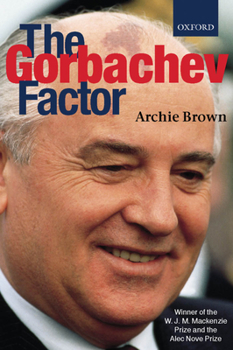The Gorbachev Factor
Select Format
Select Condition 
Book Overview
General Secretary of the Soviet Communist Party and political reformer, winner of the Nobel Peace Prize and the force behind perestroika, Mikhail Gorbachev was arguably the most important statesman of the twentieth century. When he assumed power in March 1985, it was unimaginable that the Soviet Union would, in the space of seven years, be transformed out of existence. Enormous obstacles confronted any leader intent on changing the Soviet system radically--...
Format:Hardcover
Language:English
ISBN:0198273444
ISBN13:9780198273448
Release Date:July 1996
Publisher:Oxford University Press, USA
Length:426 Pages
Weight:1.89 lbs.
Dimensions:1.2" x 6.4" x 9.5"
Customer Reviews
2 ratings
One Man Had a Plan!
Published by Thriftbooks.com User , 19 years ago
Archie Brown has written a thought provoking and sympathetic analysis of the political leadership of Mikhail Gorbachev spanning his rein as Secretary General of the Central Committee (president) of the Soviet Union from 1985 to its collapse in 1991. Brown argues it was the "Gorbachev Factor," the Secretary General's role as a reformer, an initiator of change that totally transformed the Soviet Union's political system to that of a pluralist structure based on a democratic socialist model. Although the author admits this is not a biography of Gorbachev and points out the importance of placing the man within the context of political, economic and social events of the time, Gorbachev remains the central focus of this work. Brown counters several of the myths, both emanating from the West as well as within the Soviet political structure regarding the pros and cons of Gorbachev's tenure. Brown states Gorbachev had an agenda of four transformational reforms when he took office in 1985. Individual chapters in the book cover these goals in detail. First was the plan for economic reform (Chapter 5). Second, Gorbachev envisioned the liberalization of the present political system (Chapter 6). Third, involved revising Soviet foreign policy including replacing the Soviet hegemony in Eastern Bloc countries with a cooperative alternative; drastically reduce the Soviet military presence in those countries; pull out of Afghanistan; and ending the Cold War between East and West (Chapter 7). A forth consideration involved the nationalist question concerning sovereignty and statehood within the borders of the Soviet Union, and the challenge of preserving that union (Chapter 8). What Gorbachev did not envision, nor had he anticipated, emphasizes Brown, was the eventual collapse of the Soviet Union. Brown believes Gorbachev's greatest contribution lies in the political arena. Brown claims Gorbachev acted more like a western politician than any of his predecessors. Gorbachev it seems was able to pull off impossible political feats while working within the constraints of the Soviet system. By 1989-1990, argues, Brown, Gorbachev surely made the Soviet political system "different" than the one he had inherited. By "different," the author means the government became a pluralist system with the introduction of contested elections and the establishment of autonomous political organizations. As the author notes, this became a double-edged sword as a result of losing the eastern countries, "the fruit of the Soviet Union's victory in the Second World War," a conservative element, headed by the real culprit in Brown's view: Boris Yeltsin, began to exert pressure. Brown counters those who claim Gorbachev initially paid lip service to Marxist-Leninist ideology and bent to pressure from the far right. Brown simply illustrates that Gorbachev required the use of subtle vocabulary instead of attacking the Soviet system head on. Gorbachev did not want to become another Khrushchev and b
Well done!
Published by Thriftbooks.com User , 26 years ago
In the first sentence of "The Gorbachev Factor," Archie Brown tells his readers that his work "is neither a history of the Gorbachev era, nor a biography of Mikhail Gorbachev." On reading that, this "country boy" had to ask..."well what is it?" Well, by the end I knew: Brown's work is an outstanding analysis of Mikhail Gorbachev's influence on Soviet history in the 1980's. It is a well written, well researched and well documented account not just of Gorbachev's role during this time, the the myiad factors that influenced Gorbachev. Now, there "ain't" no doubt that Brown likes Gorbachev. While Brown points our more than ove of Gorbachev's faults, the lion's share of Brown's work tend to vindicate his actions and elevate his intent. But this is no simple apology for the leader of a regime that fell. Rather, it is an in-depth look at the incredable challenges and paradoxical results of Mikhail Gorbachev's leadership of the Soviet Union.






